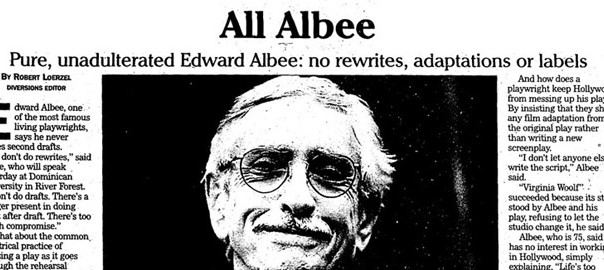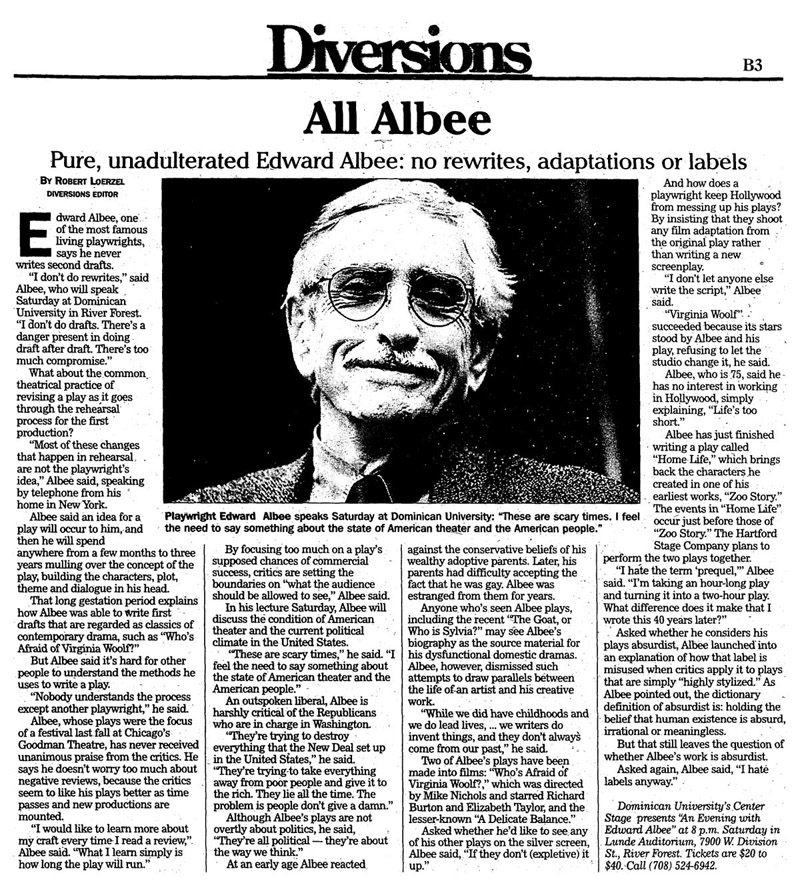This article by Robert Loerzel originally appeared in Pioneer Press on February 18, 2004.
Edward Albee, one of the most famous living playwrights, says he never writes second drafts.
“I don’t do rewrites,” said Albee, who will speak Saturday at Dominican University in River Forest. “I don’t do drafts. There’s a danger present in doing draft after draft. There’s too much compromise.”
What about the common theatrical practice of revising a play as it goes through the rehearsal process for the first production?
“Most of these changes that happen in rehearsal are not the playwright’s idea,” Albee said, speaking by telephone from his home in New York.
Albee said an idea for a play will occur to him, and then he will spend anywhere from a few months to three years mulling over the concept of the play, building the characters, plot, theme and dialogue in his head.
That long gestation period explains how Albee was able to write first drafts that are regarded as classics of contemporary drama, such as “Who’s Afraid of Virginia Woolf?”
But Albee said it’s hard for other people to understand the methods he uses to write a play.
“Nobody understands the process except another playwright,” he said.
Albee, whose plays were the focus of a festival last fall at Chicago’s Goodman Theatre, has never received unanimous praise from the critics. He says he doesn’t worry too much about negative reviews, because the critics seem to like his plays better as time passes and new productions are mounted.
“I would like to learn more about my craft every time I read a review,” Albee said. “What I learn simply is how long the play will run.”
By focusing too much on a play’s supposed chances of commercial success, critics are setting the boundaries on “what the audience should be allowed to see,” Albee said.
In his lecture Saturday, Albee will discuss the condition of American theater and the current political climate in the United States.
“These are scary times,” he said. “I feel the need to say something about the state of American theater and the American people.”
An outspoken liberal, Albee is harshly critical of the Republicans who are in charge in Washington.
“They’re trying to destroy everything that the New Deal set up in the United States,” he said. “They’re trying to take everything away from poor people and give it to the rich. They lie all the time. The problem is people don’t give a damn.”
Although Albee’s plays are not overtly about politics, he said, “They’re all political — they’re about the way we think.”
At an early age Albee reacted against the conservative beliefs of his wealthy adoptive parents. Later, his parents had difficulty accepting the fact that he was gay. Albee was estranged from them for years.
Anyone who’s seen Albee plays, including the recent “The Goat, or Who is Sylvia?” may see Albee’s biography as the source material for his dysfunctional domestic dramas. Albee, however, dismissed such attempts to draw parallels between the life of an artist and his creative work.
“While we did have childhoods and we do lead lives, … we writers do invent things, and they don’t always come from our past,” he said.
Two of Albee’s plays have been made into films: “Who’s Afraid of Virginia Woolf?,” which was directed by Mike Nichols and starred Richard Burton and Elizabeth Taylor, and the lesser-known “A Delicate Balance.”
Asked whether he’d like to see any of his other plays on the silver screen, Albee said, “If they don’t (expletive) it up.”
And how does a playwright keep Hollywood from messing up his plays? By insisting that they shoot any film adaptation from the original play rather than writing a new screenplay.
“I don’t let anyone else write the script,” Albee said.
“Virginia Woolf” succeeded because its stars stood by Albee and his play, refusing to let the studio change it, he said.
Albee, who is 75, said he has no interest in working in Hollywood, simply explaining, “Life’s too short.”
Albee has just finished writing a play called “Home Life,” which brings back the characters he created in one of his earliest works, “Zoo Story.” The events in “Home Life” occur just before those of “Zoo Story.” The Hartford Stage Company plans to perform the two plays together.
“I hate the term ‘prequel,’” Albee said. “I’m taking an hour-long play and turning it into a two-hour play. What difference does it make that I wrote this 40 years later?”
Asked whether he considers his plays absurdist, Albee launched into an explanation of how that label is misused when critics apply it to plays that are simply “highly stylized.” As Albee pointed out, the dictionary definition of absurdist is: holding the belief that human existence is absurd, irrational or meaningless.
But that still leaves the question of whether Albee’s work is absurdist.
Asked again, Albee said, “I hate labels anyway.”

